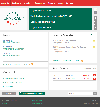
|
Uralkali’s facilities are not located in specially protected natural areas (SPNA). The Company’s activities do not threaten species included in the Red List of the International Union for Conservation of Nature (IUCN) and Russia’s Red Books. |

|
Uralkali annually takes measures to improve the state of biological resources in water bodies. These activities include the release of juvenile fish species to help restore local ecosystems. Uralkali has carried out artificial reproduction of biological resources annually since 2015. |

|
In accordance with Russian legislation, the Company draws up plans for asset liquidatation during the early stages of a project and estimates the land rehabilitation costs. These costs are reassessed trhoughout the project’s implementation. |

|
In 2021-2022, Uralkali conducted a biodiversity assessment within its area of influence with the help of the Institute of Natural Sciences of the Perm State National Research University. Following the assessment, a biodiversity conservation programme will be developed. |
The biodiversity assessment carried out in 2022 included 96 km of walk-overs, a study of 268 species of vascular plants representing 56 different families, and an assessment of species diversity of terrestrial vertebrates. A comprehensive study of baseline biodiversity conditions in terrestrial and aquatic ecosystems, supplemented by an assessment of direct and indirect impacts of Uralkali’s operations by means of route-based studies of terrestrial ecosystems, small rivers and the river Kama, has confirmed that all species were in good condition and that no special restoration or conservation measures were necessary. Given the ecological specifics of the region, the highest diversity was observed with the bird class. Also, no red-listed species were discovered within the Company’s area of influence.





